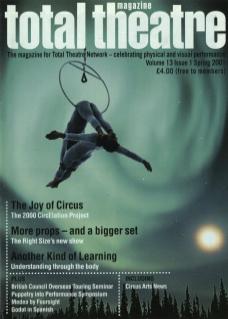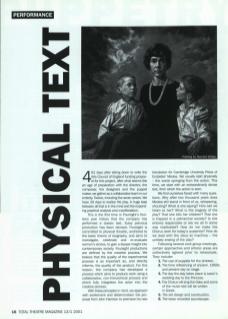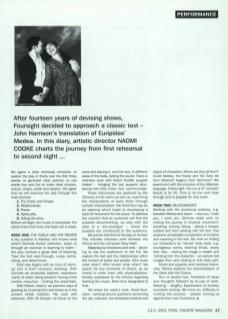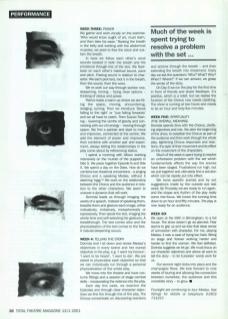61 days after sitting down to write the Arts Council of England funding proposal for this project, after what seems like an age of preparation with the director, the composer, the designers and the puppet maker, we gather as a collaborative team in our entirety. Twelve, including the seven actors. We have 29 days to realise the play. A huge leap between all that is in the mind and the impending practical analysis and manifestation.
This is the first time in Foursight's fourteen-year history that the company has performed a classic text. Every previous production has been devised. Foursight is committed to physical theatre, anchored to the basic theme of biography, and aims to investigate, celebrate and re-evaluate women's stories, to gain a deeper insight into contemporary society. Foursight productions are defined by the creative process. We believe that the quality of the experimental process is as important as, and directly informs, the quality of the product. For this reason, the company has developed a process which aims to produce work using a collaborative, non-hierarchical process and which fully integrates the actor into the creative process.
With these principles in mind, we approach with excitement and determination the proposal from John Harrison to premiere his new translation for Cambridge University Press of Euripides' Medea. We usually start physically – the words springing from the action. This time, we start with an extraordinarily dense text, from which the action is born.
We find ourselves faced with many questions. Why after two thousand years does Medea still stand in front of us, whispering, shouting? What is she saying? How can we listen to her? What is the tragedy of the play? That she kills her children? That she is trapped in a patriarchal society? Is she entirely responsible or are we all in some way implicated? How do we make the Chorus work for today's audience? How do we deal with the deus ex machina – the unlikely ending of the play?
Following several core group meetings, certain approaches and artistic areas are collectively agreed prior to rehearsals. They include:
1. The use of puppets for the children.
2. The time referencing of ancient, 1950s and present day on stage.
3. The day the play takes place is Jason's wedding day to the Princess.
4. The Chorus will sing the Odes and some of the music text will be written in Greek.
5. The set design and construction.
6. The basic recorded soundscape.
We agree a clear rehearsal schedule: to explore the play in thirds over the first three weeks; to generate clear options; to use weeks four and five to make clear choices, reduce, shape, polish and deepen. We agree that we will examine the play through five main themes:
1. The Public and Private.
2. Relationships.
3. Power.
4. Spirituality.
5. Telling the story.
Before we begin, the music is composed, the actors know their lines, the basic set is ready.
Week One: The Public and the Private
A key question in Medea: who knows what when? Dorinda Hulton (director), leads us through an exercise in learning to listen – the play involves a great deal of listening – then the first read through. Lively, exhilarating, and determined.
Each day begins with an hour of warm-up and a brief company meeting. With Dorinda we physically explore: relaxation; clarity of order; being present; having a free centre; reduction – finding the essentials.
With Patrick (Jason): we examine ways of greeting by touching chin and knees as in the ancient Greek tradition. We work with extremes. With Jill (Nurse): we focus on the voice and placing it, and the text, in different areas of the body, rooting the sound. There is intensive work with Alison Duddle (puppet maker) – bringing the boy puppets alive, seeing how they move, feel, communicate.
These discoveries are explored by Ria (Chorus) in her warm-up with us, examining the manipulation of each other through contact improvisation. We think this may be an opening which leads to developing a style of movement for the piece. To address the concern that an audience will find the puppets disconcerting, we play with the idea of a 'pre-prologue' – where the puppets are introduced to the audience.
We put the first third of the play on its feet. This includes intensive work between the Chorus and the composer Mary Keith – mapping out entrances and exits – deciding to use the auditorium to the full. We explore the text and the relationships within the context of public and private. Who hears what when? Who knows what when? We search for key moments of choice, as we intend to mark them with physicalisation. Anxiety expressed by the Chorus regarding learning the music. More time designated to that.
We share the week's work. Good feedback – centring around questions concerning the set, costume, the rehearsal schedule and origins of characters. Where are they all from? Could Medea, the Nurse and the Tutor be from Albania? Aegeus from Germany? We experiment with the inclusion of the Albanian language. It feels right. The run is 47 minutes! Needs to be 35. Time to let the work soak through and to prepare for next week.
Week Two: Relationships
Working with the emotional subtexts, e.g. between Medea and Jason – I love you, I hate you, I want you. Dorinda leads work on rooting the journey in physical movement: travelling, turning, falling – taking a chosen subtext and then working with the text. This awakens remarkable complexities of emotion and meaning in the text. We work on finding our character's six 'named’ body parts, e.g. courageous womb, retching throat, weary feet. Also – rooting the image in breath and 'climbing into the character’ – we explore text imaged from and relating to that body part.
Music and puppetry work continue intensively. Patrick explores the physicalisation of the Odes with the Chorus. Run of section two. Feedback of ideas and thoughts followed by re-cap of work. Meeting – lengthy. Expressions of anxiety, inevitable venting. We move on. Difficulty in trusting the process – people coming up against their own limitations.
Week Three: Power
We gather and work vocally on the exercise: 'Who would know ought of art, must learn, and then take his ease.' Rooting the breath in the belly and working with the abdominal muscles, we seek to free the voice and sustain the breath.
In twos we follow each other's vocal sounds located in both the breath and the emotional through-line of the text. We feedback on each other's habitual sound, pace and pitch. Freeing sound in relation to character. We each pick text, root it in the breath, then the sound, then the word.
We re-work our way through section one, deepening, honing – trying clear options – thinking of status and power.
Patrick leads a warm-up where we are filling the space, moving, encountering, dodging, turning. Then we introduce 'Derek falling to the right' or 'Lisa falling forwards’ and we all have to catch. Then Suzuki Training – lowering the centre of gravity and connecting with our chi energy – moving through space. We find a partner and start to move and improvise, connected at the centre. We add the element of power and improvise, then combine with another pair and experiment, always letting the relationships in the play come about by referencing status.
I spend a morning with Alison working intensively on the murder of the puppets in Ode 5. We piece together Episode 6 and Ode 5. We spend a day on the Odes. How do we combine two theatrical conventions – a singing Chorus and a speaking Medea – without it seeming edgy? We work on the relationship between the Chorus and the audience in relation to the other characters. We seem to uncover a dynamic that will work.
Dorinda leads us through imaging the words of a speech. Instead of speaking them, breathe them and gesture each image, either indicatively, imitatively, metaphorically or expressively. Then speak the text, imaging the whole time and self-selecting the gestures. A breakthrough. The text comes alive and the physicalisation of the text comes to the fore. A natural deepening occurs.
Week 4: Telling the Story
Dorinda and I sit down and revise Medea's objectives in every scene and her overall objective in the play, e.g. 'I want my honour', 'I want to be heard', 'I want to die'. We are asked to physicalise each objective so that we can individually run through a personal physicalisation of the whole play.
We move into the theatre and have costume fittings and a session of stage combat skills – incorporating the violence into the play.
Each day this week, we examine the Episodes and through clear character objectives we find the through-line of the play. The Chorus concentrate on discovering reactions and actions through the breath – and then extending the breath into movement. Every day we ask the questions 'Who? What? Why? When? Where?'. If we can answer, we grasp the sense of the story.
On Day 5 we run the play for the first time in front of friends and share feedback. It's positive, which is a relief, but we realise the function of the Chorus now needs clarifying, The show is running at two hours and needs to be an hour and forty-five minutes.
Week Five: Spirituality (The Overall Meaning)
Dorinda spends time with the Chorus, clarifying objectives and role. We alter the beginning of the show, to establish the Chorus as part of the audience and then work through the whole play, tightening Chorus responses and reactions, the style of their movement and its effect on the movement of the characters.
Much of the week is spent trying to resolve an unforeseen problem with the set which fundamentally affects the way the scenes have been staged. Frustrations run high, but we pull together and ultimately find a solution which can be rapidly put into effect.
We hone specific scenes and try out suggestions made by the outside eye last week. By Thursday we are ready to run again, and the shape and rhythm of the play really come into focus. We knock the running time down to an hour and fifty minutes. The play is now ready for an audience.
Week Six
We open at the MAC in Birmingham, to a full house. The show doesn't go as planned. Fear seems to grip us and we lose that deep sense of connection with character. For me, playing Medea, it was a case of trying too hard. Being on stage and forever working harder and harder to find the woman. We feel deflated. Dorinda suggests we let go. We must focus on our character objectives and above all want to tell the story – to let Euripides' words work for US.
Our second night clicks into place and the champagne flows. We look forward to nine weeks of touring and allowing the connection – between ourselves, the audience and this incredible story – to grow.



